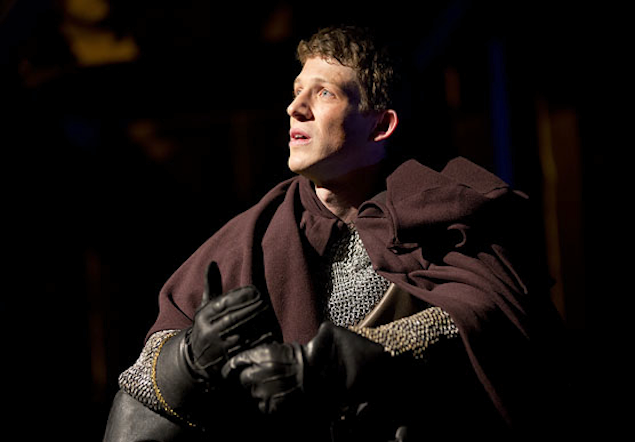
Both England and its special friend across the pond have
always had something of a
soft spot for a naughty Prince
Harry.
The Nazi uniform-wearing, inappropriate language-using,
naked-in-Vegas version rides
his polo pony on the cover of
Town & Country this month
as the most eligible bachelor in the world—his misadventures apparently only adding
to his charm. At the Folger Theatre meanwhile,
Zach Appelman’s strawberry-blond Henry V is so eloquent, so engaging, that it’s hard not to leave
the theater thinking of him as one of the greatest male characters Shakespeare ever
wrote.
Robert Richmond’s production, playing through March 3 at the Folger Library, is an outstanding interpretation
of the fourth and final installment of the Henriad tetralogy, combining a raucously
funny approach with a thoughtfulness about war and its legacy. Prince Hal, a layabout
and gadfly who haunted the taverns of London with Falstaff in
Henry IV Parts I and II, is now King Henry V, and while Appelman’s Henry still seems young enough to shave
irregularly, his character takes ruling very seriously. A plot against his life by
three noblemen is dealt with swiftly and aggressively, while a “gift” from France
ridiculing his status as a leader results in a straightforward invasion.
As always, the Folger’s space is used creatively, and the set design by
Tony Cisek is ambitious. Long wooden beams attached to ropes are raised and lowered from scene
to scene, morphing from palace to ship to battleground with minimal interruption.
It’s a deliberately sparse approach that allows the performances to resonate. Early
on in act one, two actors enter on wooden “horses,” gymnasium-ready constructions
that are unselfconsciously comical and accompanied by the clip-clopping of hooves.
After the one-person chorus (Richard Sheridan Willis, who embodies multiple characters while acting as Henry’s antagonist) concludes his
introduction, the company marches onstage together, emphasizing the military business
that underpins the play.
Henry takes his newfound stature seriously, addressing a French lord who brings him
a casket full of tennis balls with fearsome rage. But glimpses of Hal shine through,
when the king cracks up with his friends and attempts to woo a French princess who
speaks no English by raising the sound of his voice. This is a nuanced portrayal of
a complex man who’s an excellent leader—a sympathetic tyrant who needlessly invades
France and threatens to rape and murder its citizens, but who also walks in disguise
among his troops to assess their morale. By revealing the king’s ability to laugh
at his own stern affect, Richmond helps the audience see him as a more rounded and
likable character still finding his feet as a leader.
The supporting cast are also excellent, from
Chris Genebach’s noble Exeter to
James Keegan’s tragic Pistol.
Katie de Buys does double duty as the elegant Princess Katherine and a young boy in Falstaff’s
duty who sheds real tears over his demise.
Louis Butelli, a Folger staple, adopts a bulbous red nose to play the conniving drunk, Bardolph.
And Richmond deftly flips three actors (Edward Christian,
Pomme Koch, and
Andrew Schwartz) from being English conspirators against Henry to playing French enemies, managing
to recycle actors while enhancing our embattled perception of the play’s hero.
With such simple staging the battle scenes are more of a challenge, but
Michael Rasbury’s sound design helps conjure a realistically bloody Battle of Agincourt, complete
with a post-explosion ringing in the ears that feels more like
The Hurt Locker than a history play. Despite the fact that this is such an aggressively male play
(women really don’t do anything except speak French and—in the case of Mistress Quickly—die
of venereal disease), Richmond seems eager to explore the emotional consequences of
conflict. Henry’s agonizing over his troops and the responsibility he bears them is
prolonged, and the death of one of his most loyal soldiers is deeply moving. Violence,
whether inflicted by enemies with arrows or executioners with nooses, is never far
away.
But it’s
Richard Sheridan Willis’s presence as a dark-eyed enemy that most seems to emphasize the play’s seriousness,
despite its bawdy and irrepressible humor (you may never want to eat leeks again).
Unlike the musician (Jessica Witchger) whose semi-permanent presence hovering over scenes occasionally feels contrived,
Willis haunts the stage like a mournful ghost when he isn’t acting as a solemn go-between.
Henry’s calls to battle are so stirring that it’s hard to resist the impulse to defend
England, but Richmond offers us a constant reminder that things are rarely so simple
in love of war.
Henry V
is at the Folger Theatre through March 3. Running time is about two hours and 35 minutes,
including one intermission. Tickets ($30 to $68) are available via the Folger’s website.
















